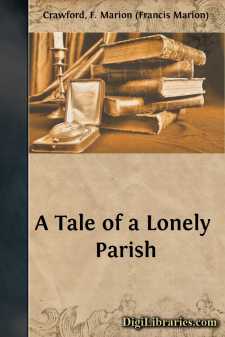Categories
- Antiques & Collectibles 13
- Architecture 36
- Art 48
- Bibles 22
- Biography & Autobiography 813
- Body, Mind & Spirit 142
- Business & Economics 28
- Children's Books 17
- Children's Fiction 14
- Computers 4
- Cooking 94
- Crafts & Hobbies 4
- Drama 346
- Education 46
- Family & Relationships 57
- Fiction 11829
- Games 19
- Gardening 17
- Health & Fitness 34
- History 1377
- House & Home 1
- Humor 147
- Juvenile Fiction 1873
- Juvenile Nonfiction 202
- Language Arts & Disciplines 88
- Law 16
- Literary Collections 686
- Literary Criticism 179
- Mathematics 13
- Medical 41
- Music 40
- Nature 179
- Non-Classifiable 1768
- Performing Arts 7
- Periodicals 1453
- Philosophy 64
- Photography 2
- Poetry 896
- Political Science 203
- Psychology 42
- Reference 154
- Religion 513
- Science 126
- Self-Help 84
- Social Science 81
- Sports & Recreation 34
- Study Aids 3
- Technology & Engineering 59
- Transportation 23
- Travel 463
- True Crime 29
F. Marion (Francis Marion) Crawford
Francis Marion Crawford (1854-1909) was an American writer noted for his prolific output of novels and short stories, many of which explore supernatural themes. His most famous works include the "Saracinesca" series and the horror story "The Screaming Skull." Crawford's rich, descriptive prose and ability to evoke atmospheric settings have earned him a lasting place in the Gothic and supernatural literary traditions.
Author's Books:
Sort by:
Chapter VII. “Has anything gone wrong?” There was so much of interest and sympathy in her tone, as Joe put the simple question, that John turned and looked into her face. The magic of moonlight softens the hardest features, makes interest look like friendship, and friendship like love; but it can harden too at times, and make a human face look like carved stone. “No, there is nothing wrong,”...
more...
Two men were sitting side by side on a stone bench in the forgotten garden of the Arcadian Society, in Rome; and it was in early spring, not long ago. Few people, Romans or strangers, ever find their way to that lonely and beautiful spot beyond the Tiber, niched in a hollow of the Janiculum below San Pietro in Montorio, where Beatrice Cenci sleeps. The Arcadians were men and women who loved poetry in...
more...
CHAPTER I. Lay your course south-east half east from the Campanella. If the weather is what it should be in late summer you will have a fresh breeze on the starboard quarter from ten in the morning till four or five o'clock in the afternoon. Sail straight across the wide gulf of Salerno, and when you are over give the Licosa Point a wide berth, for the water is shallow and there are reefs along...
more...
CHAPTER I. The inner room of a tobacconist's shop is not perhaps the spot which a writer of fiction would naturally choose as the theatre of his play, nor does the inventor of pleasant romances, of stirring incident, or moving love-tales feel himself instinctively inclined to turn to Munich as to the city of his dreams. On the other hand, it is by no means certain that, if the choice of a stage...
more...
CHAPTER I. Don Orsino Saracinesca is of the younger age and lives in the younger Rome, with his father and mother, under the roof of the vast old palace which has sheltered so many hundreds of Saracinesca in peace and war, but which has rarely in the course of the centuries been the home of three generations at once during one and twenty years. The lover of romance may lie in the sun, caring not for...
more...
CHAPTER I Frau von Sigmundskron was not really much past middle age, though the people in the village generally called her the old baroness. Her hair was very white and she was thin and pale; her bold features, almost emaciated, displayed the framework of departed beauty, and if her high white forehead and waxen face were free from lines and wrinkles, it must have been because time and grief could find...
more...
CHAPTER I The Baroness Volterra drove to the Palazzo Conti in the heart of Rome at nine o'clock in the morning, to be sure of finding Donna Clementina at home. She had tried twice to telephone, on the previous afternoon, but the central office had answered that "the communication was interrupted." She was very anxious to see Clementina at once, in order to get her support for a new and...
more...
CHAPTER I 'I cannot help it,' said Filmore Durand quietly. 'I paint what I see. If you are not pleased with the likeness, I shall be only too happy to keep it.' The Marchesa protested. It was only a very small matter, she said, a something in the eyes, or in the angle of the left eyebrow, or in the turn of the throat; she could not tell where it was, but it gave her niece a little...
more...
CHAPTER I When the widow of Martino Consalvi married young Corbario, people shook their heads and said that she was making a great mistake. Consalvi had been dead a good many years, but as yet no one had thought it was time to say that his widow was no longer young and beautiful, as she had always been. Many rich widows remain young and beautiful as much as a quarter of a century, or even longer, and...
more...
CHAPTER I. The Reverend Augustin Ambrose would gladly have given up taking pupils. He was growing old and his sight was beginning to trouble him; he was very weary of Thucydides, of Homer, of the works of Mr. Todhunter of which the green bindings expressed a hope still unrealised, of conic sections—even of his beloved Horace. He was tired of the stupidities of the dull young men who were sent to him...
more...











